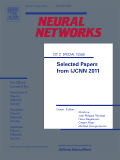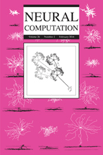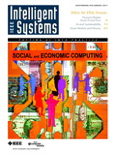
NEURAL NETWORKS
Scope & Guideline
Shaping Tomorrow's Technologies through Rigorous Research
Introduction
Aims and Scopes
- Neural Network Architectures and Innovations:
Research on new architectures for neural networks, including convolutional, recurrent, and hybrid models that enhance performance in various applications. - Learning Algorithms and Optimization Techniques:
Development and analysis of algorithms for training neural networks, including optimization methods, reinforcement learning strategies, and adaptive learning techniques. - Applications of Neural Networks:
Exploration of practical applications of neural networks in fields such as computer vision, natural language processing, robotics, and bioinformatics. - Theoretical Foundations and Interpretability:
Studies that aim to understand the theoretical underpinnings of neural networks, including their expressiveness, generalization capabilities, and interpretability. - Adversarial Learning and Robustness:
Research focusing on the resilience of neural networks against adversarial attacks and the development of techniques to enhance their robustness.
Trending and Emerging
- Neural Architecture Search (NAS):
An increasing focus on automated methods for discovering optimal neural network architectures, indicating a shift towards optimization and efficiency in model design. - Explainable AI and Interpretability:
A growing interest in making neural networks more interpretable, focusing on understanding decision-making processes, which is crucial for trust in AI systems. - Federated Learning and Privacy Preservation:
Emerging research in federated learning highlights the need to perform machine learning on decentralized data while maintaining privacy, reflecting concerns about data security. - Integration of Neural Networks with Other AI Techniques:
An increasing trend towards combining neural networks with reinforcement learning, evolutionary algorithms, and other AI methodologies to tackle complex problems. - Physics-Informed Neural Networks:
A rise in research that integrates physical laws into the training of neural networks, showcasing their application in modeling complex systems.
Declining or Waning
- Traditional Supervised Learning Techniques:
As attention shifts to more complex learning paradigms such as semi-supervised, unsupervised, and reinforcement learning, traditional supervised learning techniques are being explored less frequently. - Basic Neural Network Models:
Research focusing on simpler neural network models, such as basic feedforward architectures, is becoming less common in favor of more advanced architectures and hybrid approaches. - Static Neural Network Applications:
The interest in applications of static neural networks for traditional tasks is waning, as dynamic, adaptive, and context-aware models gain traction. - Manual Feature Engineering:
The trend towards automated feature learning through deep learning has reduced the focus on manual feature engineering in neural network applications.
Similar Journals

NEURAL COMPUTATION
Exploring the dynamic interplay between neurons and algorithms.NEURAL COMPUTATION, published by MIT PRESS, is a leading academic journal that focuses on the interdisciplinary field of neural computing, combining insights from artificial intelligence, cognitive neuroscience, and computational modeling. With an impressive impact factor and consistently high rankings—being positioned in the Q1 category of Arts and Humanities and Q2 in Cognitive Neuroscience—this journal serves as a vital resource for researchers and professionals interested in understanding the complex interactions between neural processes and computational systems. Founded in 1995 and continuing through its converged years until 2024, NEURAL COMPUTATION publishes cutting-edge articles that advance theoretical knowledge and practical applications in both fields. While it does not provide open access, the journal ensures rigorous peer-review processes, making it an essential platform for disseminating significant research findings. With its commitment to fostering innovation and understanding at the intersection of neuroscience and computation, NEURAL COMPUTATION stands out as a cornerstone for academic exploration and discovery.

Machine Intelligence Research
Driving Knowledge Forward in Machine IntelligenceMachine Intelligence Research is a premier academic journal published by SPRINGERNATURE, dedicated to advancing knowledge in the rapidly evolving fields of Artificial Intelligence, Applied Mathematics, and more. With its ISSN 2731-538X and E-ISSN 2731-5398, the journal is recognized for its impact, holding a distinguished position in various Q1 categories for 2023, including Computer Vision and Pattern Recognition and Control and Systems Engineering. Operating under an Open Access model, it ensures that groundbreaking research from China and around the world remains accessible to a global audience, promoting collaboration and innovation. As a beacon for researchers, professionals, and students, Machine Intelligence Research aims to disseminate high-quality research findings, innovative methodologies, and influential theories, thereby shaping the future landscapes of science and technology.

IEEE INTELLIGENT SYSTEMS
Pioneering Research in Machine Learning and BeyondIEEE Intelligent Systems, published by the renowned IEEE Computer Society, stands at the forefront of research in the fields of Artificial Intelligence and Computer Networks and Communications. With an impressive Q1 ranking in both categories as of 2023 and Scopus rankings placing it in the top 5% of its field, this journal not only showcases cutting-edge scientific advancements but also serves as a vital resource for practitioners, academics, and students seeking to deepen their understanding and application of intelligent systems. The journal covers a broad range of topics including machine learning, data mining, and system architectures, reflecting its commitment to addressing contemporary challenges and innovations in technology. Although it does not offer open access, the journal's research contributions are invaluable, ensuring that its readership remains engaged with the latest findings and applications in a rapidly evolving field. For those interested in submitting high-quality research or staying updated on the latest developments, IEEE Intelligent Systems represents an essential hub of knowledge.

International Journal of Fuzzy Logic and Intelligent Systems
Exploring Innovative Pathways in Intelligent SystemsInternational Journal of Fuzzy Logic and Intelligent Systems, ISSN: 1598-2645, is a prestigious journal published by the Korean Institute of Intelligent Systems, dedicated to advancing the fields of Artificial Intelligence, Computational Theory and Mathematics, Computer Science Applications, Logic, and Signal Processing. Established to foster interdisciplinary research, this journal has quickly established its reputation, reaching a respectable Q3 quartile ranking across multiple categories in 2023. It serves as a vital resource for researchers, professionals, and students, offering insights into cutting-edge methodologies and innovative applications of fuzzy logic and intelligent systems. With a focus on disseminating high-quality research, the journal attracts contributions that drive the evolution of intelligent technologies and their practical implications. Published from South Korea, the journal is positioned to impact the global community, facilitating a deeper understanding of intelligent systems in various domains.

NEURAL COMPUTING & APPLICATIONS
Unlocking the Potential of Neural AlgorithmsNEURAL COMPUTING & APPLICATIONS is a premier journal dedicated to the burgeoning fields of Artificial Intelligence and Software Engineering, published by Springer London Ltd. Established in 1993, the journal serves as a pivotal platform for disseminating cutting-edge research and innovative applications in neural computing, covering a broad range of topics from algorithm development to real-world applications. With its impressive categorization in the 2023 Journal Quartiles—ranging Q2 in Artificial Intelligence and Q1 in Software—it stands out in its discipline, ranking 42nd out of 407 in Computer Science Software and 50th out of 350 in Computer Science Artificial Intelligence, reflecting its significant impact in the academic community. Although not an open access journal, it provides vital access to significant findings and methodologies that drive advancements in technology. Researchers, professionals, and students looking to stay abreast of the most relevant and impactful developments in these fields will find NEURAL COMPUTING & APPLICATIONS an indispensable resource.

AI, published by MDPI, is a distinguished open access journal dedicated to advancing the field of artificial intelligence. Since its inception in 2020, the journal has swiftly established itself as a prominent platform for scholarly research, currently ranking in the Q2 category for 2023 within the artificial intelligence sector according to Scopus. With an impressive global reach from its base in Basel, Switzerland, the journal aims to foster innovation and collaboration among researchers, professionals, and students alike, providing a forum to share groundbreaking findings and applications in AI. The journal's commitment to accessibility ensures that research is available to a wide audience, enhancing knowledge dissemination and contributing significantly to the ongoing evolution of artificial intelligence technologies. To explore the latest in AI research, readers can access articles through their open access model, encouraging an inclusive academic environment.

Frontiers in Computational Neuroscience
Bridging Biological Understanding and Computational Excellence.Frontiers in Computational Neuroscience, published by FRONTIERS MEDIA SA, is a leading journal within the fields of neuroscience and computational biology, dedicated to advancing the understanding of the brain's complex functions through innovative computational methodologies. Since its establishment in 2007, this Open Access journal has provided a platform for researchers around the globe to share their groundbreaking findings, as evidenced by its continual presence in the academic conversation and a strong ranking within Scopus metrics (Rank #12/49 in Neuroscience - Neuroscience (miscellaneous) and Rank #63/97 in Cellular and Molecular Neuroscience). With an esteemed impact factor reflective of its quality and influence, and a commitment to providing freely accessible research, this journal plays a crucial role in fostering collaboration and knowledge dissemination among professionals, researchers, and students alike. Located in the scientific hub of Switzerland, it invites submissions from diverse perspectives, aiming to bridge the gap between computational models and biological insights through rigorous peer-reviewed publications.

Journal of Advanced Computational Intelligence and Intelligent Informatics
Advancing Knowledge in Computational IntelligenceThe Journal of Advanced Computational Intelligence and Intelligent Informatics, published by FUJI TECHNOLOGY PRESS LTD, stands as a pivotal platform in the fields of Artificial Intelligence, Computer Vision, and Human-Computer Interaction. Established in 1997, this Open Access journal has been providing accessible insights into the latest advancements in computational intelligence and informatics since 2007. With its ISSN 1343-0130 and E-ISSN 1883-8014, this journal invites a diverse readership, including researchers, professionals, and students eager to explore innovative methodologies and applications. Despite its current Q4 ranking in the relevant categories, the journal remains committed to contributing valuable knowledge to the academic community and enhancing the global discourse in computational technologies. With its focus on fostering communication and collaboration among scholars, the journal plays an essential role in driving forward the understanding of intelligent systems and their applications in various domains.

International Journal of Automation and Computing
Transforming Ideas into Solutions in AutomationInternational Journal of Automation and Computing, published by SPRINGERNATURE, is a premier academic journal dedicated to advancing knowledge in the fields of applied mathematics, computer science applications, control and systems engineering, and modeling and simulation. With an impressive impact factor and consistently ranked in the Q1 Quartile for its respective categories in 2023, the journal is recognized for its high-quality research and contributions to the automation and computing sectors. This journal provides open access to its articles, promoting the dissemination of innovative ideas and methodologies across a global audience. Based in China but serving an international community, the journal is key for researchers, professionals, and students looking to stay at the forefront of automation and computing technologies. Its rigorous peer-review process ensures that published works meet the highest scientific standards, making it an essential resource for those seeking to deepen their understanding and engage in cutting-edge research.

NEURAL PROCESSING LETTERS
Showcasing Cutting-Edge Developments in Neural Processing.NEURAL PROCESSING LETTERS, published by Springer, is a prestigious journal dedicated to the interdisciplinary fields of Artificial Intelligence, Computer Networks and Communications, Software Engineering, and Neuroscience. Established in 1994, the journal has built a solid reputation over the past decades, showcasing innovative research and developments that significantly contribute to the advancement of these dynamic areas. With a 2023 Scopus quartile ranking of Q2 in Artificial Intelligence and Computer Networks and Communications, and a Q3 ranking in Neuroscience, this journal occupies an important niche for professionals and researchers alike. The journal’s impact is further evidenced by its competitive Scopus ranks, positioning it within the top 60th percentile across its categories. Researchers looking for a platform to disseminate their findings in the intersection of technology and neuroscience will find NEURAL PROCESSING LETTERS an invaluable resource. For additional engagement and visibility, the journal supports various access options; however, it's important to note that it does not currently operate under an open access model. For submissions or queries, the journal can be reached at its headquarters in Dordrecht, Netherlands.